Add this eBook to your basket to receive access to all 430 records. Our indexes include entries for the spelling falconer. In the period you have requested, we have the following 430 records (displaying 21 to 30): These sample scans are from the original record. You will get scans of the full pages or articles where the surname you searched for has been found. Your web browser may prevent the sample windows from opening; in this case please change your browser settings to allow pop-up windows from this site. Cecil Manuscripts
(1590-1594)
Letters and papers of William Cecil lord Burghley, Lord Treasurer of England. | Sample scan, click to enlarge
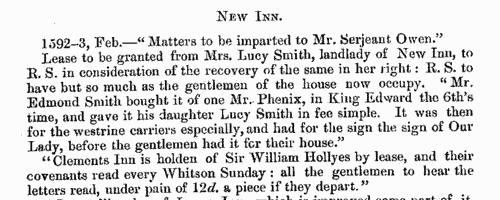
| Scottish litigants, rebels and cautioners
(1592-1599)
The Privy Council of Scotland exercised a superior judicial authority in the kingdom, and consequently received and dealt with a constant stream of petitions, as well as dealing with the internal security of the state. This register of the council from August 1592 to May 1599, in the reign of king James VI, was edited by David Masson and published under the direction of the Deputy Clerk Register of Scotland in 1882. The publication brings together the contents of the principal register (Acta Secreti Concilii) with acts and bands (bonds) of caution (surety) from the registers called Acta Cautionis (pp 561-730); Acts and Ordinances relating to the Borders and the North (731-748); and Miscellaneous Privy Council Papers (749-769). Many of the individuals mentioned are the complainants, those of whom they complained, and the sureties on both sides: at this period, many of the complainants are alleging serious attacks, often of a feuding nature. Many of the bonds entered into by the cautioners are promises to keep the peace towards such enemies. Failure to answer to the council when summoned was a serious contempt, leading to being denounced a rebel, with serious consequences.
| Sample scan, click to enlarge

| Hastings family deeds
(1100-1600)
John Harley of the Historical Manuscripts Commission was invited by Reginald Rawdon Hastings to examine his family's extensive archives at the Manor House, Ashby de la Zouche, in Leicestershire. Harley produced a detailed calendar, of which is the first volume, published in 1928, Hastings himself having since died, and Harley having been killed at Gallipoli. This volume covers four categories of the records: the Ancient Deeds; Manorial and other Documents; Accounts and Inventories; and Miscellaneous Papers. Most, but not all, of the material is mediaeval. About half of the deeds relate to the family property in Leicestershire; then there are sections for Derbyshire, Nottinghamshire, Northamptonshire, Lincolnshire, Warwickshire, Staffordshire, Yorkshire, Northumberland, Norfolk, Cambridgeshire, Huntingdonshire, London, Wiltshire, Somersetshire, Devonshire, Buckinghamshire, Oxfordshire, &c. The manorial section includes a partitions of the estates of the Earls of Leicester and Wilton about 1204 and 1277; manor court rolls are mentioned, but not extracted. Choicer items from the family accounts and inventories are copied in extenso for 1596 and 1607, and thereafter summarised. Most of the later material is merely dipped into for curiosities. | Sample scan, click to enlarge

| Secretary of State's Papers
(1602)
The letters and papers of sir Robert Cecil, Secretary of State, deal with all manner of government business in England, Ireland and abroad. | Sample scan, click to enlarge
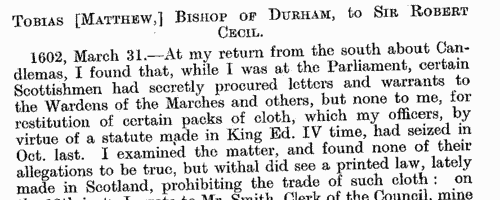
| Knaresborough testators, legatees and witnesses
(1510-1606)
Knaresborough in the West Riding of Yorkshire lay in the ancient diocese of York, but was part of a large separate probate jurisdiction or peculiar encompassing the parishes of Burton Leonard, Farnham cum Scotton, Fewston, Great Ouseburn, Hampsthwaite, Knaresborough, South Stainley, Staveley, and some small adjoining areas. Grants of probate and administration, as well as copies of wills, were recorded on the Knaresborough court rolls. Dr Francis Collins prepared abstracts of all enrolled wills, grants of administration, and of tuition, from the 2nd year of the reign of king Henry VIII to the 3rd and 4th of James I, 'no matter how insignificant in life the testator may have been or how uninteresting the will', and these were published by the Surtees Society in 1902. | Sample scan, click to enlarge
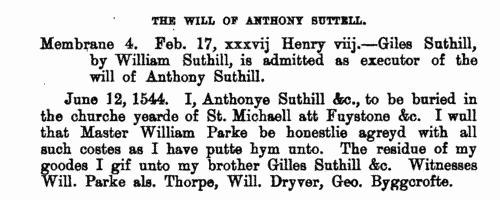
| Cheshire gentry and their ancestors
(1580-1613)
Richard St George, Norroy King of Arms, and Henry St George, Bluemaster Pursuivant of Arms, of the College of Arms, conducted a heraldic visitation of Cheshire in 1612 and 1613, recording pedigrees of gentlemen claiming the right to bear coats of arms. A copy of their visitation was elaborated by the addition of other Cheshire pedigrees in Harleian Manuscript 1535: and this manuscript was edited by sir George J. Armytage and John Paul Rylands for publication by the Harleian Society in 1909. It has a large number of pedigrees of Cheshire gentry, with a few brief abstracts from early documents; and the pedigrees of some offshoots from old Cheshire stocks which had taken root in other counties. The pedigrees largely relate to the period back from 1613 to the previous visitation of 1580, but there is also some older material, particularly back into the 15th century. In most cases each pedigree is prefixed by a heraldic description of the coat of arms. The printed volume also includes (pages 1 to 4) a list of Cheshire men who disclaimed the right to bear a coat of arms at the 1613 visitation, taken from Harleian Manuscript 1070. | Sample scan, click to enlarge
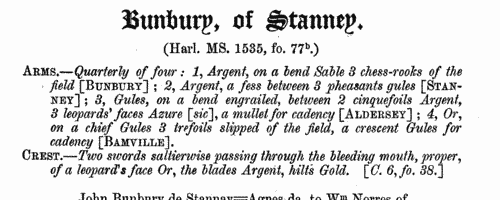
| Scottish litigants, rebels and cautioners
(1610-1613)
The Privy Council of Scotland exercised a superior judicial authority in the kingdom, and consequently received and dealt with a constant stream of petitions, as well as dealing with the internal security of the state. This register of the council from July 1610 to February 1613, in the reign of king James VI, was edited by David Masson and published under the direction of the Deputy Clerk Register of Scotland in 1889. The publication starts with the Acta and Decreta, a chronological consolidation of material from Acta Secreti Concilii proper, the Decreta, the Book of Commissions, the Book of Sederunts, the Minute Book of Processes, and The Book of the Isles. There is then a section of Royal and Other Letters (pp. 565-644); then acts and bands (bonds) of caution (surety) from the registers called Acta Cautionis (pp. 647-690); and Miscellaneous Privy Council Papers (693-746). Many of the individuals mentioned are the complainants, those of whom they complained, and the sureties on both sides: at this period, many of the complainants are alleging serious attacks, often of a feuding nature. Many of the bonds entered into by the cautioners are promises to keep the peace towards such enemies. Failure to answer to the council when summoned was a serious contempt, leading to being denounced a rebel, with serious consequences.
| Sample scan, click to enlarge

| Merchants and traders in Aberdeen
(1399-1631)
A. M. Munro searched the council registers of the royal burgh of Aberdeen, and compiled this list of burgesses admited to the borough. The entries prior to 1591 were contained in lists engrossed in the council registers at the close of the minutes for the year ending at Michaelmas, but after that date in addition to the annual lists, which are continued, there is almost always a separate minute of admission under the respective dates. The records before 1591 are not only sparser, often with no more than a name, but are also lacking for 1401-1405, 1413-1432, 1434-1435, 1518-1519, 1557 and 1562-1564 - other blanks were filled in from the guildry accounts where such existed. Guild burgesses were allowed unfettered trading rights in Aberdeen; simple burgesses could only deal in Scottish wares (so being barred from the lucrative English and Flemish imports and exports); trade burgesses were limited to their own particular trades; and the council was able ex gratia to create honourary burgesses, who were accorded the full privileges of burgesses of guild and trade, and among whom numbered members of almost every family of note in Aberdeenshire. Burgesses could thus be created by descent, by apprenticeship into a trade, or ex gratia, and in the later portions of this roll the precise circumstances are usually given, sometimes also with the name of a cautioner or surety. Burgesses, masters and cautioners are all indexed here. | Sample scan, click to enlarge

| PCC Probates and Administrations
(1631)
The Prerogative Court of Canterbury's main jurisdiction was central and southern England and Wales, as well as over sailors &c dying abroad: these brief abstracts, compiled under the title "Year Books of Probates", and printed in 1902, usually give address, date of probate and name of executor or administrator. They are based on the Probate Act Books, cross-checked with the original wills, from which additional details are, occasionally, added. The original spelling of surnames was retained, but christian and place names have been modernised where necessary. | Sample scan, click to enlarge
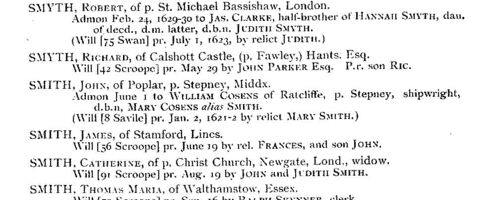
| PCC Probate Abstracts
(1630-1634)
The Prerogative Court of Canterbury's main jurisdiction was central and southern England and Wales, as well as over sailors &c dying abroad: these brief abstracts usually give address, date of probate and name of executor or administrator
| Sample scan, click to enlarge

|
Research your ancestry, family history, genealogy and one-name study by direct access to original records and archives indexed by surname.
|











